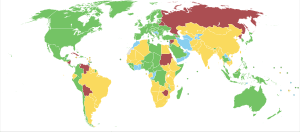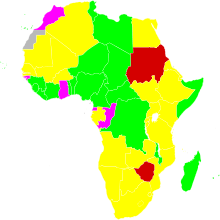United Nations General Assembly Resolution 68/262
United Nations General Assembly Resolution 68/262 was adopted on March 27, 2014 by the sixty-eighth session of the United Nations General Assembly in response to the Russian annexation of Crimea and entitled "Territorial integrity of Ukraine". The non-binding resolution, which was supported by 100 United Nations member states, affirmed the General Assembly's commitment to the territorial integrity of Ukraine within its internationally recognized borders and underscored the invalidity of the 2014 Crimean referendum. Eleven nations voted against the resolution, while 58 abstained, and a further 24 states were absent when the vote took place.
| UN General Assembly Resolution 68/262 | |
|---|---|
| Date | 27 March 2014 |
| Meeting no. | 80th Plenary |
| Code | A/RES/68/262 (Document) |
| Subject | Territorial Integrity of Ukraine |
Voting summary |
|
| Result | Resolution adopted |



The resolution was introduced by Canada, Costa Rica, Germany, Lithuania, Poland and Ukraine.[1] The adoption of the resolution was preceded by the unsuccessful attempts of the United Nations Security Council, which convened seven sessions to address the Crimean crisis, only to face a Russian veto[2] of draft resolution S/2014/189,[3] sponsored by 42 countries.
Voting rationales
Nicos Emiliou, Permanent Representative of Cyprus to the United Nations, who favoured the resolution said that "Cyprus underlines the importance of respecting the fundamental principles of sovereignty, territorial integrity and independence of all states, including Ukraine".[4] Emiliou urged to conduct a probe on all acts of violence and encouraged Russia to engage in a diplomatic solution.[4]
The Permanent Representative of China to the United Nations Liu Jieyi, whose country abstained from voting, stated that "in the context of the ongoing diplomatic mediation efforts by the parties concerned, an attempt to push ahead with the UNGA vote on the draft resolution on the question of Ukraine will only further complicate the situation".[1]
Russian reaction
On March 28, 2014 the Russian Federation stated that the resolution was counterproductive and accused Western states of using blackmail and threats to drum up approval votes.[5]
Voting
Related UNGA resolutions
- Res. 71/205, December 19, 2016, "Situation of human rights in the Autonomous Republic of Crimea and the city of Sevastopol (Ukraine)"[7][8]
- Res. 72/190, December 19, 2017, “Situation of human rights in the Autonomous Republic of Crimea and the city of Sevastopol, Ukraine”[9]
- Res. 73/194, December 17, 2018, "Problem of the militarization of the Autonomous Republic of Crimea and the city of Sevastopol, Ukraine, as well as parts of the Black Sea and the Sea of Azov"[10]
- Res. 73/263, December 22, 2018, "Situation of human rights in the Autonomous Republic of Crimea and the city of Sevastopol, Ukraine" [11]
- Res. 74/17, December 9, 2019, "Problem of the militarization of the Autonomous Republic of Crimea and the city of Sevastopol, Ukraine, as well as parts of the Black Sea and the Sea of Azov"[12]
References
- "UN General Assembly adopts resolution affirming Ukraine's territorial integrity". Xinhua. 28 March 2014. Retrieved 30 March 2014.
- "Backing Ukraine's territorial integrity, UN Assembly declares Crimea referendum invalid". UN. 27 March 2014. Retrieved 30 March 2014.
- S/2014/189 Retrieved 2017-09-05. (https://www.un.org/en/ga/search/view_doc.asp?symbol=S/2014/189)
- "Cyprus votes in favour of UN resolution on Crimea". Cyprus Mail. 28 March 2014. Retrieved 30 March 2014.
- "Russia criticizes U.N. resolution condemning Crimea's secession". Reuters. 28 March 2014. Retrieved 30 March 2014.
- "Voting Record on Draft Resolution A/68/L.39 Territorial Integrity of Ukraine". PaperSmart. United Nations. Retrieved 2014-04-11.
- "UN General Assembly votes for resolution on human rights in Crimea". UNIAN.info. Retrieved 2017-10-26.
- "Resolution 71/205 "Situation of human rights in the Autonomous Republic of Crimea and the city of Sevastopol (Ukraine)"" (PDF). United Nations. 2016-12-19.
- Pechonchyk, Tetiana (2017-12-19). "New UN resolution on Crimea confirms Russia is an occupying power, brings 10 important changes for Ukraine". Euromaidan Press. Retrieved 2019-07-14.
- "UN General Assembly adopts resolution on Crimea". www.ukrinform.net. Retrieved 2019-01-23.
- "United Nations Official Document". www.un.org. Retrieved 2019-02-20.
- Resolution 74/17, 'Problem of the militarization of the Autonomous Republic of Crimea and the city of Sevastopol, Ukraine, as well as parts of the Black Sea and the Sea of Azov' (PDF). United Nations. 2019-12-09.